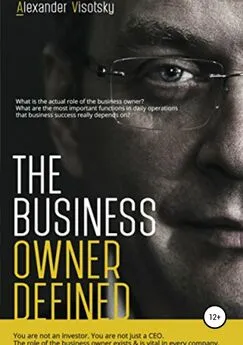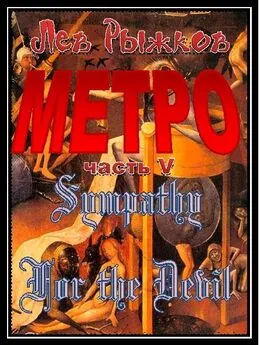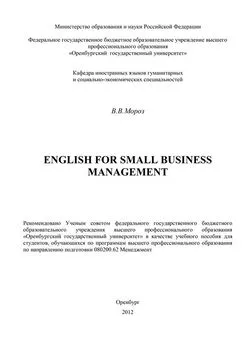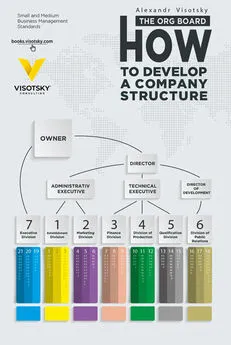Александр Высоцкий - A Job Description for the Business Owner
- Название:A Job Description for the Business Owner
- Автор:
- Жанр:
- Издательство:неизвестно
- Год:2019
- ISBN:978-1-5404-2202-6
- Рейтинг:
- Избранное:Добавить в избранное
-
Отзывы:
-
Ваша оценка:
Александр Высоцкий - A Job Description for the Business Owner краткое содержание
A Job Description for the Business Owner - читать онлайн бесплатно ознакомительный отрывок
Интервал:
Закладка:
Acknowledgements
This book could not have been written without the support of the employees and partners of Visotsky Consulting, Inc. They are incredibly dedicated to their work and are committed to helping business owners. I want to express special thanks to the business owners who graduated from our Business Owners Program. Many of the ideas for this book came from my conversations with them.
Introduction
One might consider this book to be quite unusual. It is not about how to start a business, or how to earn millions. And it is not for those who dream only about creating their own businesses. Instead, the target reader for this book is someone who has already created his or her own business and continues to participate in the daily activities of the company.
Those who have founded their own businesses often fall into the trap of being too involved in or personally performing the day-to-day operations of the enterprise, only to find they cannot escape—sometimes for a lifetime. They set up companies to achieve their dreams, yet years later they feel like hamsters spinning on a wheel. To some extent, any founder of a company knows that his or her main purpose is not to solve daily operational issues personally. They understand that in focusing on strategic matters, they will be able to contribute much more to the business than by simply making sales or managing technical issues. There is a reason why most small to medium-size business owners cannot escape the daily grind and thus continue to be more like clerks at a grocery store, never “growing out of their first pair of pants.” One might say they become victims of their own success.
People like to continue doing the things about which they feel competent. That makes sense. Success is usually based on a high level of competence, and that includes knowledge, skills, and experience. New companies are created by enthusiasts, the experts in their fields, and it takes years and considerable effort to achieve that high level of excellence in anything. Real pleasure and comfort come only when such competence is acknowledged and results in a loyal client and customer base, an increase in revenues, and public recognition of the brand. It's very rewarding to receive well-deserved recognition. This natural to want to enjoy one’s success, but therein lies the trap: There is no desire to change anything fundamentally.
In order for a company founder to rise above day-to-day operational activities, it is necessary to think and act in a completely new way. This means leaving one’s familiar comfort zone and going beyond one’s current levels of confidence and competence for a period of time. The first step is to figure out in which direction to move, and why. In order to be able to delegate operational management to a top-level executive and become one’s own business strategist, it is first necessary to understand what the job is all about.
This book describes the real job of a company owner as a professional activity with certain very precise responsibilities. My intention is to define these responsibilities in a practical and cogent way, since they are actually really simple by nature. While reading this book, you will likely find that you have already been carrying out many of these duties of a business owner intuitively and that all the progress you have made with your business has, in one way or another, been linked to the fact that you have acted in a correct manner. If this were not true, then only graduates of specialized business schools could create successful businesses, and that is not the case. The only difference between a professional approach and an intuitive one is that the professional clearly understands what he or she did right, and what was done incorrectly. Being informed allows for a conscious use of the experience.
I am sure that after reading this book you will have a clearer understanding of the most important duties of a business owner and will be able to do your job in a more informed way. This will give you the opportunity to place operational management into reliable hands and elevate your company to a whole new level.
Chapter 1. The Business Owner’s Role
Why do some companies grow large, their names and products familiar to everyone, while others just barely survive, lingering for years on the edge of bankruptcy? For example how was Apple able to create a cult, a fashion, an emotional commitment for its premium-priced products (before 1994, when the iPod and iPhone were not on the market) in a highly competitive market offering products at lower prices? How did they do it? And why is McDonald’s so successful? Its restaurants are considered an essential part of any civilized place in the world despite constant criticism by nutrition experts and challenges from competitors. It can be assumed that the reason for success is some amazing product that is available on the market and is so attractive to customers that it guarantees the company a bright future. The product is important, but obviously there is something more to it. There are plenty of successful restaurants with delicious food and good service that are not as renowned as McDonald’s. Likewise, there are many technological devices, but few are as well recognized as those created by Apple.
You might never have heard of the McDonald brothers’ restaurant if one day Ray Kroc, salesman and co-owner of a small company manufacturing mixers for public catering, had not seen a line of customers at the only McDonald’s restaurant and gotten excited about the idea of opening a chain of these restaurants based on the same model. Interestingly, Kroc was not the first to franchise the restaurant’s operations. The McDonald brothers had been selling franchises for a while without much success. That is why they readily agreed to let Kroc take over the franchise sales.
The point here is that behind every truly successful enterprise there is always a determined individual who is loyal to his own ideals and ready to go all the way. And when such a person is also a very skilled manager, his company achieves unbelievable results. While both the competitive business environment and good market conditions are certainly important, neither are able to create a business masterpiece. Behind every masterpiece, there is always an individual at the top who strategizes everything.
The formation of groups is one of the oldest human endeavors. The history of mankind includes a number of civilizations, but no single civilization could have existed without its founders and leaders. Nowadays, when developed countries choose democracy, this political system seems to enable a group of people to create something worthwhile on their own. But after a more thorough evaluation, it becomes apparent that no single group has achieved considerable success unless that success was purposefully and persistently pursued by the leader of the group. The modern kingdom of corporations, brands, and corporate management creates an illusion that some kind of collective intelligence is responsible for building a successful enterprise. But the fact remains that behind every tremendous success is a talented leader who is loyal to his ideals. Mankind admires this kind of person and remembers his or her name. However, for some strange reason, people try to imitate the external demonstration of success while ignoring its very basis. They focus on the what , but give too little consideration to the why .
Two Types of Business Owners
In coming to understand the true role of a business owner, it is important to be aware of the two most common types of owners. The ancient works of Indian literature known as the Vedas help give us a way to describe them. Vedic religious traditions, including various characters and philosophic concepts, became a part of such religious and philosophical systems as Brahmanism, Hinduism, Jainism, and Buddhism, all of which were based on the Vedas. The Vedas are a source of socioeconomic and cultural information about ancient Indian history.
According to the Vedas, every person achieves his own level of spiritual development and has the traits and abilities inherent to someone at that level. Ancient Indians called these social levels varnas . The Vedas maintained that during his lifetime a person progresses up the levels while forming and developing particular personality characteristics. A person on the highest stage of spiritual personality development is called a Brahmin. Scientists, artists, and religious figures fall into this category. The stage below Brahmin is called Kshatriya. Kings, military commanders, leaders, and all people who devote their lives to service achieve this stage. Then there is the Vaishya stage, mostly represented by merchants and craftsmen. Those at the Vaishya stage can create groups as well, but due to their particular traits, they are fundamentally different from the Kshatriya. The Kshatriya serve their own group and have the group’s benefit as their main goal. In contrast, someone at the Vaishya stage needs a group to achieve his own personal success and enrichment. I am not claiming that this classification is very scientific, but it seems to be an apt way to assess different types of leadership. If you study various companies carefully, you will find that particular aspirations and traits inherent to the Kshatriya and the Vaishya are dominant in certain business owners.
A group’s achievements depend on its leader. And it is quite valuable to know that any group has a much greater chance of becoming successful if a Kshatriya is the leader, rather than a Vaishya. In contemporary terms, it can be said that a group whose leader does not have a genuine desire to ensure the prosperity of the entire group will never be truly successful. This is not based on conjecture, but on empirical evidence.
In Shanghai, I met the founder, owner, and manager (all one individual) of the B&Y Marketing Agency. At the time, B&Y employed twenty-five people who produced wonderful TV commercials and outdoor advertisements, in addition to designing shopping malls. For the previous few years, the company had stalled out and its yearly revenues had remained at about $1.5 million. I was interested in the discrepancy between the company’s high-quality products and its lack of growth, given China’s rapid economic development. During my conversation with the owner, I found that his main motive when starting the company was to provide an affluent lifestyle for himself and his family. This business owner was a perfect example of a highly qualified professional Vaishya who was trying to surround himself with assistants just to produce a quality product and enrich himself. It quickly became apparent to me that unless he changed his viewpoint about the way to run his business, his company would never advance.
In 1995, my friends and I started the MacCenter Company in Ukraine. We specialized in selling and servicing Apple computers, and for several years I was the CEO and chairman of the board of directors. Even though the company was relatively small, it was highly professional. Now when I look back, I see that the main reason I founded the company was my personal desire to have a well-paid job that I liked doing.
Like many other enterprises, our company started from nothing. We renovated the office ourselves, tried to get our hands on some affordable office equipment, and had to come up with various schemes to get our first orders. For the first few months, we had to take part-time jobs as security guards because we did not have enough money to pay our staff. We even took turns spending nights at the office, cleaning it, and working as chauffeurs, couriers and porters. At the time, we were not even an authorized Apple reseller and service provider. But we were able to buy a shipment of Macintosh computers from an authorized dealer and, functioning as an intermediary, resell them to another authorized dealer. Our profit from the transactions consisted of two computers, which represented the main “capital” of our company. When we became authorized resellers, our first customers included some Western organizations like Motorola, the U.S. Peace Corps, and USAID, which were just opening offices in Ukraine. We were selling computers to offices and publishing houses, and by the end of our first year, we were the number one reseller in Ukraine. This was the height of our success. We were able to hire a sufficient number of personnel, and we had loyal customers and stable revenues. This was a time when the market was increasing steadily and the opportunities were almost limitless.
Читать дальшеИнтервал:
Закладка:










